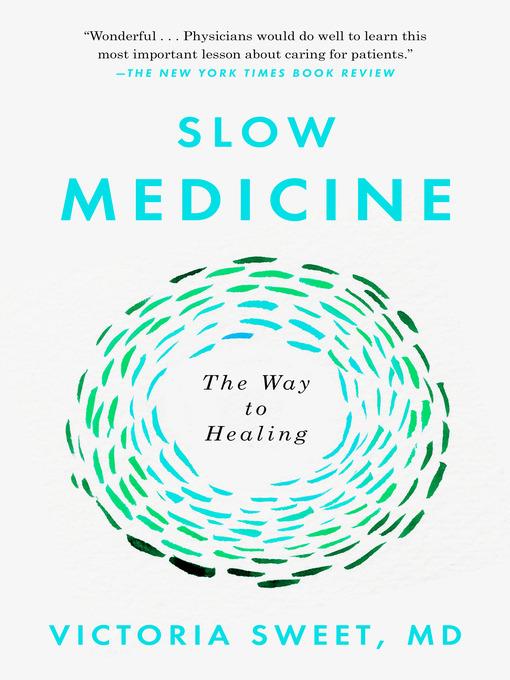
Slow Medicine
The Way to Healing
- اطلاعات
- نقد و بررسی
- دیدگاه کاربران
نقد و بررسی

August 15, 2017
A doctor dissatisfied with the modern delivery of health care details how she developed her ideas about how medicine should be practiced.Sweet (Medicine/Univ. of California, San Francisco; God's Hotel: A Doctor, a Hospital, and a Pilgrimage to the Heart of Medicine, 2012), a physician, historian, and master storyteller, has provided an autobiographical prequel to God's Hotel, recounting her years in training to become a doctor and her early experiences treating patients. The moments she highlights here are those that revealed some aspect of what she calls Slow Medicine. Sometimes, it involves nurses and doctors showing calmness, confidence, expertise, and a personal touch; sometimes, it is patients whose treatments provide revelatory moments. Sweet recalls scenes from years ago in full detail, describing settings, physical appearances, and lengthy conversations. These personal scenes, which constitute the bulk of the book, make for a highly readable narrative. While the author appreciates the world of modern "Fast Medicine," with its logic, methods, and technology, she argues that its view of the body as a machine to be fixed would benefit from a consideration of the body as a garden to be tended. Taking time out from clinical work, Sweet studied other medical systems--e.g., ayurvedic, Chinese, folk--and especially the writings of Medieval nun Hildegard of Bingen. The author learned Latin so she could read her work in the original, and it is from her that Sweet takes the concept of viriditas, the healing power of nature. The role of the physician, she writes, is to nourish this power, to remove what is in the way, to see the whole patient in her environment, and to think deeply about her life and figure out what is wrong and what can be changed. Though Sweet's firm belief that Slow Medicine is necessary in today's high-tech world will strike some as impractical, the sick will take comfort in this physician's warm, personal, knowledgeable approach.
COPYRIGHT(2017) Kirkus Reviews, ALL RIGHTS RESERVED.

September 15, 2017
In this fine anecdotal chronicle and call for better health care, physician Sweet (God's Hotel: A Doctor, a Hospital, and a Pilgrimage to the Heart of Medicine, 2012) tells horror stories from the medical front line. Some are profoundly intimate (her father's near-fatal misdiagnosis) while others recall her demanding experiences as a medical professional. Over the years, as she attests, health care has become increasingly bureaucratic while more and more doctors and nurses devote less and less time to actually seeing their patients. It amounts to medicine without a soul, Sweet writes. What the world needs, she maintains, is health care that guarantees presence, attention, judgment, kindness, and, responsibility. She calls this type of health care slow medicine. The conception of sensitive, relationship-based care was, she explains, revealed to her over time as she worked with other doctors, nurses, and, above all, patients. Slow medicine, she writes, is a way of seeing, of doing, and, most profoundly, of being. Sweet provides a strong and necessary tonic as health care, in all its complexities, remains at the center of the national conversation.(Reprinted with permission of Booklist, copyright 2017, American Library Association.)

April 15, 2017
A physician at San Francisco's Laguna Honda Hospital, Sweet came to our attention a few years back with God's Hotel: A Doctor, a Hospital, and a Pilgrimage to the Heart of Medicine. Here, she makes a case for the "slow medicine" she continues to practice, which focuses on bodies rather than data and leads to a kinder, gentler, more personalized and sustainable type of care.
Copyright 2017 Library Journal, LLC Used with permission.

September 1, 2017
Historian and physician Sweet (medicine, Univ. of California, San Francisco; God's Hotel) has encountered many changes in the medical profession. Medicine has morphed into health care. Physicians are now called providers. Efficiency and cost-effectiveness are more important than taking the time to care for patients. The author knows from experience that technology alone does not cure disease. In fact, says Sweet, it often interferes with good treatment because practitioners are too focused on completing the electronic medical record than caring for the patient in the room. Using case histories and examples from teachers, nurses, patients, and other practitioners, she proposes the practice of slow medicine, noting that it involves both art and science. Taking the time to listen, touch, and fully communicate with patients in addition to using the modern bells and whistles will result in effective, efficient care and healing. VERDICT Sound advice that all involved in health care should heed. This title will appeal to both professional and lay readers. [See Prepub Alert, 3/20/17.]--Barbara Bibel, formerly Oakland P.L.
Copyright 2017 Library Journal, LLC Used with permission.




دیدگاه کاربران